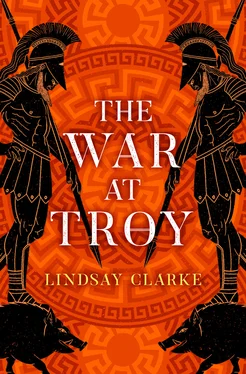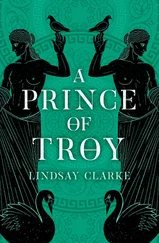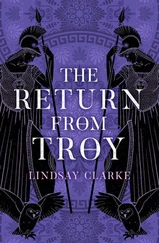Already Achilles knew that he had loved the old Centaur as he could never begin to love this remote stranger who was his father. Now he began to believe that, in being separated from his mother at birth, he had been robbed of more than he had ever dreamed. Feeling wounded and betrayed by his father, he became increasingly importunate in his demands to meet Thetis – which was a thing that Peleus still could not countenance. When the subject was brusquely closed, father and son found themselves caught in a grim bind of mutual incomprehension and hostility. Yet Peleus cared deeply for the boy and was increasingly afraid of losing him to disaffection or mischance.
One day he came into his chamber after an exhausting afternoon of giving judgement to find that a table had been moved close to the wall and the great ash spear which had been Cheiron’s wedding gift to him had vanished from the hooks on the wall where it had hung unused for many years. Furious that Achilles had taken his most prized possession without seeking his consent, Peleus went in search of the boy. He found him stripped to his breech-clout in the garden and using the trunk of an old plane tree for target practice. The spear was too long and heavy for his height, yet Achilles threw it with surprising accuracy from the distance he had set himself. Torn between his anger and his desire to congratulate his son on his marksmanship, Peleus said coldly, ‘That spear you have stolen is a warrior’s spear. Only a proven warrior has the right to wield it.’
Achilles stood flustered before his father. ‘How shall I ever be a warrior,’ he muttered sulkily, ‘when you keep me cooped up here like a bullcalf in a stall?’
Sensing all the frustrated energy locked inside that stalwart young body, Peleus felt suddenly sorry for his son and ashamed of his own morose rage.
‘Do you want to be a warrior?’ he asked.
Achilles glanced away. ‘I have watched the Myrmidons training on their field. I have watched them fighting together as if they hated one another and then oiling each other’s bodies and dressing their hair afterwards, and I wondered whether they were men or gods. What else would I want to be?’
‘Then you shall have your wish,’ Peleus said. ‘But I will keep my spear until I am sure I have a son who is fit to wield it.’
Already a skilled horseman, athlete and hunter, Achilles had never shown any concern for his own safety, and with hurt pride and anger prominent among his emotions now, he took to the volatile world of the common soldiery in much the same way that he had once felt at home among the Centaurs. Soon he began to acquire all the murderous skills of a professional fighting man.
One day his father came to watch him working with sword and spear on the practice field and was so impressed by his progress that he immediately agreed to make enquiries when Achilles asked whether Patroclus might not be allowed to come and train with him among the Myrmidons. Menoetius, who had run into similar difficulties with his own disgruntled son, readily consented, and the boys rushed to greet each other as though they had been deprived of air and light in the time when they were apart.
Over the next few years they grew ever closer – two young men united by a love so intense that they would gladly die, and kill, for each other.
Among their mentors was a commander named Phoenix, who had no children of his own, and to whom Achilles gave much of the affection that he denied to his father. Phoenix was one of the few Dolopians who had remained loyal to Peleus at the time when most of his people were migrating to Skyros, and though he was a Myrmidon warrior first and foremost, he had not renounced all the customs of his clan. So there was more than a touch of the old religion about him still. Fascinated by the blue tattoo etched into the skin of his thigh, Achilles was intrigued to learn that it was a mark of an initiation that Phoenix had undergone during the spring rites on his passage from boyhood into manhood. For a time he seemed reluctant to say any more, but Achilles reminded his tutor that he too had Dolopian blood through his mother’s side and began to ply him with more questions about his tribal heritage. The answers came slowly at first and then, when Phoenix saw how much it mattered to the boy, more freely. The vague restlessness that still sometimes troubled Achilles took on clearer form. He began to dream of his mother.
Odysseus visited Iolcus about this time and witnessed a violent argument between Peleus and Achilles. Peleus came away from it red-faced and distraught, calling for wine and complaining that Thetis was drawing their son away from him by some magical power with which he could not compete.
‘But the boy has a right to know who his mother is,’ Odysseus said, ‘and he will soon be of an age to go whether you forbid him or not. Perhaps it might be better in the long run if he went with your consent.’
Peleus grimly shook his head. ‘You’ve never met the witch who was my wife. You don’t know the kind of power she has. And Achilles is my only son and heir. I’m afraid that if I let him go to Skyros he might not come back.’
‘Such things are for the gods to decide,’ Odysseus answered, ‘but one way or another he’s going to have to get this thing out of his system. Why not allow the boy to go to Skyros but insist that he goes alone? After all, the strongest tie in his life is to his friend Patroclus. He won’t want to be separated from him for long.’
Peleus eventually saw the sense of this and acted on it. Achilles proved so reluctant to be separated from Patroclus again that for a time it looked as though he might not go at all. But the draw proved stronger than the tie. He sailed for Skyros when he was fourteen years old. As Peleus had feared, he remained there for rather longer than Odysseus had anticipated.
Skyros is a windy island out beyond Euboea in the eastern sea, about half way between Mycenae and Troy. The people there have a picturesque tale to tell about the expedition that Odysseus made to the island to retrieve Achilles.
According to them, Thetis was an immortal goddess with prophetic powers who knew that her son’s life must either be long, peaceful and obscure, or filled with undying glory and very brief. It was for this reason that she had decided to place Achilles far out of harm’s way on remote Skyros.
When Odysseus came to the island he could see no sign of the boy anywhere among the young men who lived at the court of King Lycomedes. Realizing that only cunning would prise Achilles out of hiding, Odysseus returned to his ship and came back the next day disguised as a Sidonian merchant. Having regained entry to the court, he laid out his rich store of wares on the floor before an excited gathering of young women and girls. Most of the treasures he displayed were chosen to catch their eyes – embroidered dresses, bales of cloth, perfumes and cosmetics, necklaces, bangles and other fancy baubles. Among these pretty things, however, Odysseus also placed a sword and a shield which attracted no attention whatsoever until the chattering gaggle of girls picking through his delightful assortment of goods were startled by the sudden blast of a trumpet in the yard outside. When the cry went up that the island was under attack from pirates, the girls ran from the room in alarm – all that is save one, who reached eagerly for the sword and shield.
Smiling at the success of his ruse, Odysseus brought Achilles away to the war.
It’s a good story, and no less good for the fact that much the same tale is told of the way their great heroes emerged into manhood by the people of the Indus far to the east and on Apollo’s island of the Hyperboreans far to the north. But the truth as I learned it from Odysseus is somewhat different.
Читать дальше












